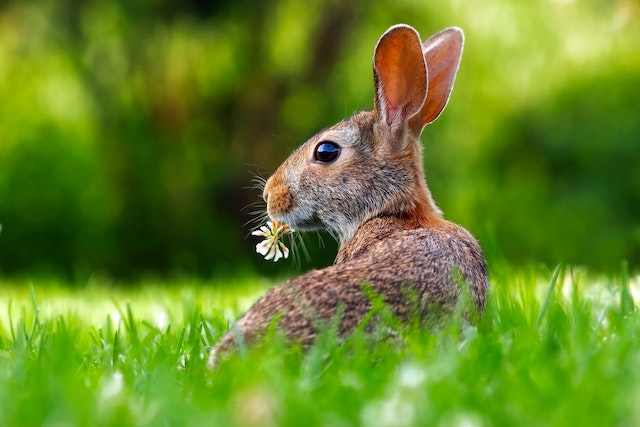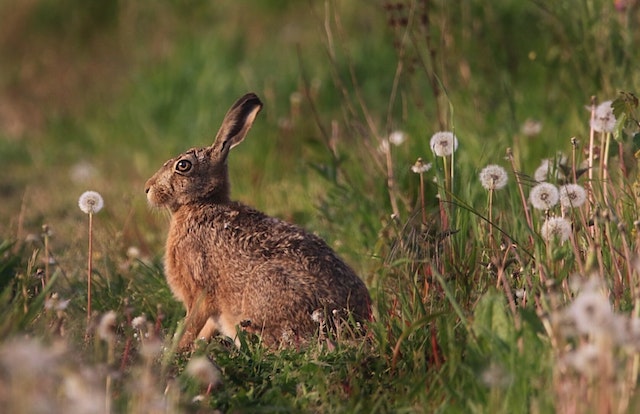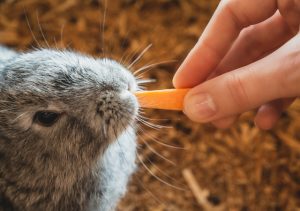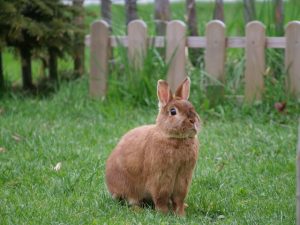Knowing what your pet bunny can eat is integral in caring for and ensuring the health and well-being of your pet. Can I Feed My Rabbit Dandelions? The short answer is: Yes! Dandelions are full of fiber. Fiber is essential for any rabbit to have a normally functioning digestive system.
The basic three-fold requirements for a healthy diet include fresh grass hay, pellets, and fresh vegetables. Over or under feeding any of these dietary requirements may lead to obesity as well as malnutrition that may lead to digestive problems.
‘Greens’ Suitable For Rabbits
Rabbits need a couple of cups of greens a day, on average, about 2-4 cups of fresh veggies can be given each day. To guide you in terms of the quantity, a 2.5kg rabbit should get anywhere between 1.5 to 2.5 cups of fresh vegetables daily.
According to RabbitWelfare, the following list is divided into sub-sections of vegetables, herbs, fruits and wild garden herbs/flowers that are deemed safe to feed rabbits, but this list is not a conclusive list and other fresh foods may also be suitable to feed to rabbits:
Vegetables:
- Artichoke leaves
- Asparagus
- Baby Sweetcorns (but not full size ones)
- Beetroot (care with leafy tops as high levels of oxalic acid)
- Broccoli (and its leaves, including purple sprouting varieties)
- Brussel Sprouts (leaves and sprouts)
- Cabbage (can sometimes cause digestive upsets)
- Carrots (and carrot tops) – the roots should be limited as they are high in sugars
- Cauliflower (and the leaves)
- Celeriac
- Celery (and its leaves)
- Chicory
- Courgette (and flowers)
- Cucumber
- Curly Kale
- Fennel
- Green beans
- Kohl rabi
- Parsnip
- Peas (including the leaves and pods)
- Peppers (red, green and yellow)
- Pumpkin
- Radish Tops
- Rocket
- Romaine lettuce (not Iceberg or light coloured leaf)
- Spinach (only occasional)
- Spring Greens
- Squash (e.g. Butternut)
- Swede
- Turnip (only occasional)
- Watercress
Herbs (often powerful tastes so may take some getting used to):
- Basil
- Coriander
- Dill
- Mint (peppermint)
- Parsley
- Oregano
- Rosemary
- Sage
- Thyme
Are Dandelions Safe? Yes
Dandelions are definitely safe for your rabbit to eat. Dandelions are very nutritious and contain even more beta-carotene that carrots, more iron and calcium than spinach, and more potassium than bananas. Other vitamins contained in the plant include vitamins B-1, B-2, B-5, B-6, B-12, C, E, and D as well as biotin, inositol, potassium, phosphorus, magnesium, and zinc.
Not only are they full of nutrients, dandelions are one of the favorites of most rabbits. Other benefits of feeding your pet dandelions include promotion of digestion and good respiratory health. They are also a natural body tonic what provide benefits to the entire body; it’s full of vitamins and phytonutrients. Dandelions are also recommended for reducing stress as well as preventing osteoporosis.
More good news: there are no poisonous look-alikes for dandelions: pretty much anything that you find with serrated leaves growing in a rosette pattern will be edible. You may pull up chicory or thistle or plantain, but these are all edible.
Vegetables can be introduced bunnies around the 12th week of age; new food should always be given in small quantities and one at a time. Once you’ve introduced dandelions, watch for diarrhea and if it occurs, discontinue giving as your pet may be sensitive, but this is a rare occurrence.
Be sure never to use dandelions that have been directly sprayed or are located in the vicinity of any kind of chemical herbicide or fertilizer.
Tips When Feeding Rabbits
Similar to people and other types of pets, fresh water must always be available to your rabbit. If you have a cage for your pet, you may opt to hang a water bottle in the cage. You may also use a water bowl. Regardless of your water dispensing method, it’s important to clean the containers as often as possible to ensure that your pet is getting clean and fresh water at all times.
If you think that your pet is not getting enough water, you may leave the vegetables fairly wet when you present them.
Try to serve a mix of three or more vegetables each day, noting the quantity indicated above. Avoid feeding food that is high in sugar, for example, fruits. These should be served only as a treat. You may give one serving per day, no larger than your thumb. When feeding fruits, do not feed the seeds or the pits!
If you will be purchasing your flowers and vegetables, be sure to know if your local nursery uses pesticides or chemicals; refrain from serving your pet items unless you are sure that they’re safe and organic.
Remember, when in doubt… Don’t serve it to your rabbit!







